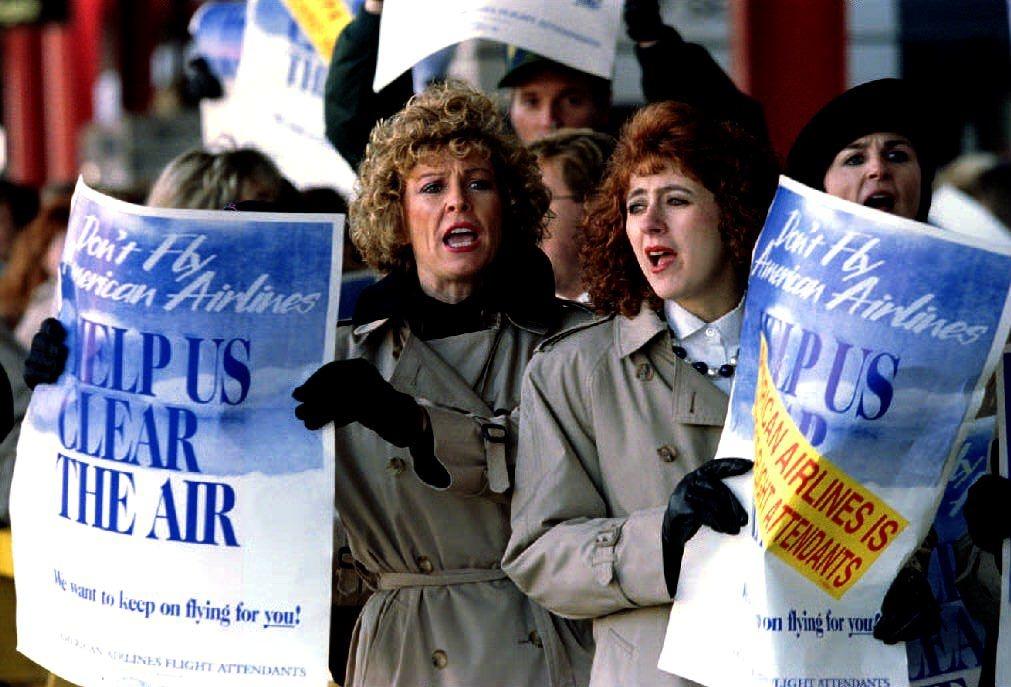For the many people who doubt that American Airlines flight attendants will strike the airline in the coming months, Julie Hedrick would like to remind them: “We have gone on strike before and we will do it again.”
In fact, it is just about two months until the 30th anniversary of the last strike by the Association of Professional Flight Attendants, which had about 21,000 members when it struck American Airlines for five days just before Thanksgiving 1993. That strike began on Nov. 18, 1993.
“We definitely have a history of striking,” said Hendricks, the APFA president and a 41-year flight attendant who participated in the 1993 strike. “If the process allows us to request to be released for self-help, a strike is an option available to us and we will use it if necessary.”
The strike lasted four days and ended Nov. 22, three days before Thanksgiving, after President Bill Clinton urged the two sides to resume talks
On Monday, American’s 15,000 pilots, members of the Allied Pilots Association, ratified a new contract that will provide about $9.6 billion in pay and quality of life improvements over the next four years. Hedrick said the carrier can now turn its full attention to flight attendant talks. “The focus has not been on the flight attendants; it has been on getting the pilot agreement done,” she said. “Now that is past and done.”
American said Thursday, in a prepared statement, “We look forward to reaching an agreement with APFA quickly so that American’s flight attendants can benefit from a contract that provides them with real and meaningful value. We continue to meet regularly and appreciate the National Mediation Board’s recent support as both American and APFA work to reach an agreement our flight attendants deserve.”
The AFA contract became amendable over four years ago. Mediation began in June. Voting for strike authorization began July 28th. The expectation is for broad approval. “If you go to any airport now, you will see American flight attendants wearing red pins. That means they have voted in the strike authorization vote,” Hedrick said.
Support has been so overwhelming, Hedrick said, that the APFA website crashed on the first day of voting. “We were happy after we got it up and running again,” she said.
APFA has asked for 35% pay increases. “We passed an economic proposal to American in March at their request,” Hedrick said. “We still haven’t received a proposal back from the company. We are tired of waiting, tired of the delays. We have narrowed the issues and passed every section of the contract. We expect significant increases in compensation and a better work life balance.”
Hedrick noted that first year pay is currently just $2,276 a month or $27,312 a year. Pay doesn’t increase much for the first five years, she said, noting “It’s been four and a half years since we’ve had a raise,” and the cost of living has risen dramatically. Another issue is boarding pay. In June 2022, Delta began paying flight attendants’ boarding pay, which means they are paid from the time they board rather than from the time the cabin door departs. APFA wants the same.
Next Wednesday, APFA, which now includes about 26,000 members, plans informational pickets at American’s twelve U.S. flight attendant bases. It will also announce results of the strike authorization vote, which is one step in the long walkup to staging a strike under the Railway Labor Act.
The Railway Labor Act is a federal law enacted in 1926 to govern relations between railroads and their union. It was amended in 1936 to include air carriers. The act generally enables employees in the two essential transportation industries to unionize, but also makes it difficult for them to strike, setting up a process that includes mediation, release from mediation and a cooling-off period before either side can engage in “self-help,” which means either a lockout or a strike. There is even a situation where the National Mediation Board can ask the President to establish an emergency board in an attempt to avoid a strike
Hedrick became a flight attendant at predecessor AirCal in 1982. When the strike began in 1993, she recalled, “I was on a redeye flight from San Francisco to New York. Midway through the flight we knew that we were going on strike. All of us were prepared for a strike: we were prepared to find our way home. We had hotel rooms for the night and we had bought tickets on other airlines to fly home.” Today, Hedrick said, APFA has a strike fund in the seven figures that will be tapped if a strike occurs.
Read the full article here





